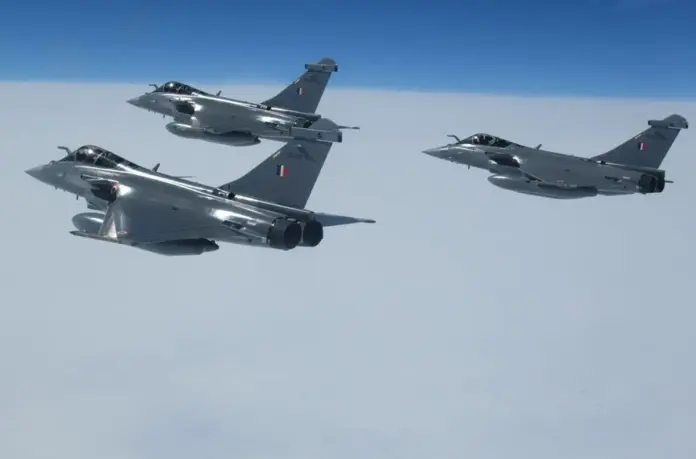In a move as symbolic as it is strategic, France has announced the deployment of three Rafale fighter jets to Poland—an ostensibly rapid response to what Warsaw brands a “Russian drone incursion” into its airspace. Behind the veneer of NATO unity lies a growing unease about the eastern flank’s fragility, with Paris trying to maintain its credibility amid eroding Western deterrence.
Macron Responds to Russian Drone Incursion With Jet Deployment
Emmanuel Macron, never short on grand declarations but often hesitant in execution, took to X (formerly Twitter) to declare that France would send three Rafale fighter jets to help “protect Polish airspace” and safeguard “Europe’s eastern flank.” This came hours after Polish Prime Minister Donald Tusk accused Moscow of violating Polish skies with no fewer than nineteen incursions by Russian drones.
The French president’s move, made in coordination with the NATO Secretary General and British Prime Minister Keir Starmer, is presented as a robust answer to Russian intimidation. But one may reasonably ask: is the dispatching of three jets—however potent—anything more than a gesture aimed at maintaining appearances in an increasingly disjointed Atlantic alliance?
Polish Airspace Violated: An “Unprecedented” Breach
The Polish government, unambiguous in its rhetoric, called the incident an “unprecedented attack” not only on Poland but also on NATO and the European Union. Three drones were reportedly shot down, while allied jets scrambled in response—an operation more reactive than preventive. It took place against the background of a war that is no longer new, but whose spillover effects are becoming harder to contain.
Warsaw convened its NATO partners for urgent talks on Wednesday, a clear indication that it sees the Russian drone incursion not as a one-off but as part of a creeping strategy. And while Moscow officially denies any intent to target Poland, the pattern is familiar: ambiguous aggression cloaked in plausible deniability, with the West lurching from incident to reaction.
Strategic Optics or Military Substance?
The announcement by Macron follows a now-habitual choreography: firm declarations, coordinated calls with allies, and promises of unity. British Prime Minister Starmer confirmed discussions with both Macron and German Chancellor Friedrich Merz, affirming that the UK “stood ready to support any further NATO deployments.” Yet readiness is not resolve, and declarations do not equate to deterrence.
The deployment of three French jets, while not negligible in technical terms, carries more symbolic weight than operational leverage. It signals France’s desire to maintain strategic relevance in Eastern Europe, even as it distances itself from the Anglo-American hard line. The move may appease Warsaw momentarily, but it does little to alter the strategic balance.
The Real Message: NATO’s Fragile Shield
The incursion underscores a deeper truth: NATO’s so-called shield is, at times, more rhetorical than real. The fact that drones—cheap, easily maneuverable, and deniable—can pierce the alliance’s airspace raises questions about the much-vaunted readiness of its eastern flank. For all the summit communiqués and declarations of Article 5 solidarity, the real test comes not in speeches but in the skies over Suwałki and Lviv.
The United Nations Security Council is expected to discuss the incident in an emergency session on Friday, following a request from five European countries. But here too, the choreography is predictable: condemnations will be made, Russia will veto any resolution, and the Security Council will once again demonstrate its impotence.
A Glimpse of Tomorrow’s Escalation
France’s decision to deploy jets to Poland after the Russian drone incursion is, at best, a limited reassurance; at worst, a theatrical performance in a long-running diplomatic farce. The core issue remains unaddressed: the West’s reluctance to draw red lines that are truly enforced. As the Russian war in Ukraine grinds into its fourth year, the borders of NATO appear increasingly permeable, not in theory, but in practice.
The Rafales may roar over Polish skies, but their flight path cannot mask the growing silence where resolve should be.



